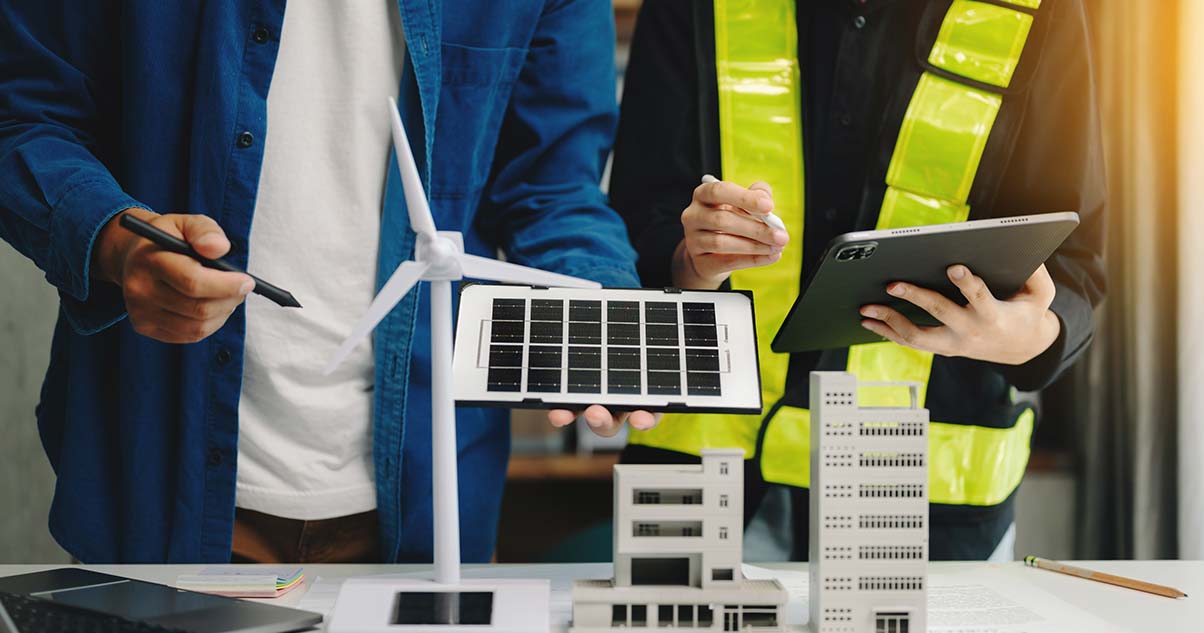Shams Power: The Hybrid Revolution: Implementing a Solar Energy System for Sustainable Living in Pakistan
With its abundant sunlight and increasing energy demands, Pakistan stands at the threshold of a renewable energy revolution. The country's commercial sector, comprising industries, businesses, and institutions, holds immense potential for leveraging solar energy to meet its power needs sustainably. This blog explores the benefits, challenges, and steps in implementing solar energy systems in Pakistan's commercial sector.
Understanding the Potential
Pakistan boasts an average of over 300 sunny days a year, making it an ideal candidate for solar energy utilization. The commercial sector, encompassing diverse activities such as manufacturing, retail, hospitality, and education, consumes a significant portion of the nation's energy resources. Transitioning to solar power presents an opportunity to reduce carbon emissions and mitigate the impact of energy shortages and escalating electricity costs.
Benefits of Solar Energy for Commercial Enterprises
Cost Savings
Installing solar panels can significantly lower electricity bills for commercial entities, offering long-term cost savings as sunlight is a free and abundant resource.
Reliability
Solar energy systems provide a reliable power source, reducing dependency on the grid and ensuring uninterrupted operations, crucial for businesses.
Environmental Impact
Switching to solar energy aligns with corporate sustainability goals, reducing carbon footprint and promoting environmental stewardship.
Tax Incentives
Governments often offer tax incentives and rebates to encourage solar adoption, providing additional financial benefits for commercial establishments.
Brand Reputation
Embracing renewable energy positively affects a company's brand, enhancing its reputation and attracting environmentally conscious customers and investors.
Challenges and Solutions:
Despite its potential, implementing solar energy systems in Pakistan's commercial sector presents several challenges:
Initial Investment
The upfront cost of solar panel installation and equipment procurement can be prohibitive for some businesses. However, financing options such as leasing, power purchase agreements (PPAs), and government subsidies can alleviate this burden.
Technical Expertise
Designing and installing solar energy systems requires specialized knowledge and skills. Partnering with experienced solar energy companies or hiring trained professionals can ensure efficient implementation.
Grid Integration
Integrating solar power with the existing electrical grid necessitates coordination with utility companies and compliance with regulatory requirements. Engaging with relevant authorities and obtaining necessary permits are crucial steps.
Maintenance
Regular maintenance is essential to ensure optimal performance and longevity of solar panels. Establishing maintenance schedules and contracting with reliable service providers can mitigate this challenge.
Public Awareness
Many businesses may need to be made aware of the benefits of solar energy or may harbor misconceptions about its feasibility. Educational campaigns and outreach initiatives can raise awareness and dispel myths, fostering greater acceptance of solar technology.
Steps to Implementation
Energy Audit
Conduct a thorough assessment of energy consumption patterns and requirements to determine the size and capacity of the solar energy system needed.
Site Assessment
Evaluate available space, orientation, and shading factors to identify suitable locations for solar panel installation.
System Design
Collaborate with solar energy experts to design a customized system tailored to the specific needs and constraints of the commercial establishment.
Financing
Explore financing options, including loans, grants, and incentives, to fund the initial investment in solar infrastructure.
Installation
Hire certified professionals to install solar panels, inverters, and other necessary equipment according to industry best practices.
Grid Connection
Coordinate with utility providers to connect the solar energy system to the electrical grid and ensure compliance with relevant regulations.
Monitoring and Maintenance
Implement a monitoring system to track energy production and performance metrics and schedule regular maintenance to optimize system efficiency.
Employee Training
Train staff members on operating and maintaining the solar energy system to maximize its benefits and longevity.
Sum up:
The adoption of solar energy holds immense potential for Pakistan's commercial sector, offering a sustainable solution to rising energy demands and environmental challenges. By overcoming technical, financial, and regulatory barriers, businesses can harness the sun's power to reduce costs, enhance reliability, and demonstrate their commitment to a greener future. Through strategic planning, collaboration, and investment, Pakistan can pave the way for a brighter, more sustainable energy landscape for future generations.
FAQs
Q1. How does solar energy benefit commercial businesses in Pakistan?
Ans: Solar energy offers several benefits to commercial businesses in Pakistan, including reduced electricity bills, increased energy independence, and potential government incentives such as tax credits and subsidies. Installing solar panels can also enhance a company's reputation by demonstrating a commitment to sustainability and environmental responsibility.
Q2. What are the key considerations for commercial enterprises when investing in solar energy systems?
Ans: Commercial enterprises in Pakistan should consider factors such as the available rooftop space for solar panel installation, the local solar irradiance levels, upfront costs versus long-term savings, financing options, and the reliability and reputation of solar energy system providers. Understanding regulatory requirements and grid connectivity issues is crucial for successful implementation.
Q3. What maintenance is required for solar energy systems in the commercial sector?
Ans: Solar energy systems typically require minimal maintenance, mainly consisting of periodic cleaning of solar panels to ensure optimal performance. Routine inspections by qualified technicians are advisable to promptly identify and address any potential issues. Additionally, monitoring the system's performance through software tools can help detect inefficiencies or malfunctions early on, ensuring uninterrupted energy production for commercial operations.
.jpg)
.jpg)


.jpg)

Comments
Post a Comment